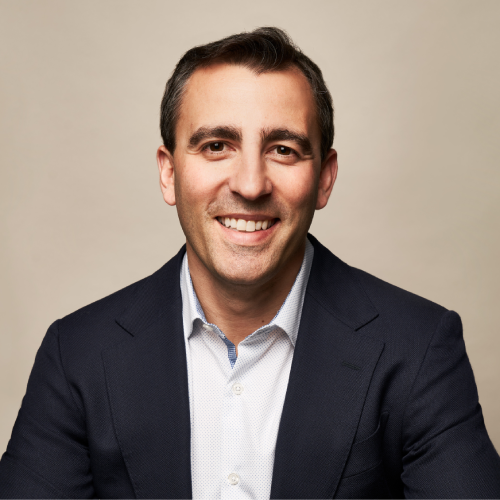What We Learned About AI From Futurist Zack Kass

Imagine a world in which a lonely man falls in love with an artificial intelligence (AI) operating system voiced by Scarlett Johansson. Sound familiar?
This is the plot of the 2013 film, “Her.” The concept seemed a bit far-fetched upon its release, but today it’s more relevant than ever — and it’s Zack Kass’ favorite dystopian movie.
“It’s so believable because it’s happening,” said Kass, futurist and former Head of Go-to-Market at OpenAI. “But we can, and should, avoid it.”
Kass joined us at Activate 2025, Coalition’s first-ever broker conference, speaking to experts across insurance, cybersecurity, and public policy about the abundant future made possible by AI. He acknowledged some very real concerns — bad actors, job displacement, and dehumanization — but also shared his vision of a world where AI expands human potential and leaves us all exponentially happier.
Below, we’ll explore the different phases of the AI revolution, the pushback and potential consequences, and why Kass believes technology will never replace the human spirit.
The AI of today and tomorrow
We’ve already witnessed defining breakthroughs with ChatGPT and other applications featuring embedded AI capabilities, which, according to Kass, have considerably increased productivity. Now, we’re starting to see businesses embrace agentic AI, in which autonomous agents take action and perform tasks on your behalf.
Looking ahead, Kass believes natural language operating systems can push the boundaries of how we have long understood technology to function. We may soon rely on “wearables” (like glasses, rings, or watches) to access information without needing a screen, an experience that could revolutionize the relationship between humans and machines as we know it.
“Technology will exist sort of passively, and that introduces a world with access to unmetered intelligence.” — Zack Kass
“We’re going to go from needing to learn how our machines work to our machines learning how we work, and that will massively reduce the digital divide,” said Kass. “Technology will exist sort of passively, and that introduces a world with access to unmetered intelligence.”
Of course, all this change in a short period may not necessarily feel like a good thing, especially when we can’t predict what the negative consequences will be. You can’t live and breathe AI for 16 years, as Kass has, without thinking of the potential societal fallout.
Will people get dumber?
Kids are struggling to read. Studies suggest that literacy is down for Gen Z and Gen Alpha. For the first time in a long while, our youth could be less informed than their predecessors, and unfettered access to technology seems to be hindering the progress of these generations.
Yet, we’re simultaneously seeing more savants and geniuses than ever. Kass predicted that, by expanding human potential, AI will broaden agency.
Those who don’t want to learn will get by with smarter technology. Meanwhile, knowledge and deeper expertise will be readily accessible for those who want it more than ever.
Will people prefer virtual reality to the physical world?
Enter the “Her” problem.
“Technology is only going to get more and more powerful,” said Kass, “and the mouse traps that companies use to gather our attention are going to get more and more impressive.”
Most of us, regardless of age, have a hard time reducing screen time. But in the future, if we don’t even need screens, Kass believes we could return to physical community instead of Facebook groups — or someone you know may date a robot.
Will bad actors get more successful?
Yes, AI is making crime easier for bad actors. We’re already seeing cyber criminals leverage AI to make phishing attempts more effective.
Kass believes we’ll have to fight back the old-fashioned way: The legal system.
Consider the penalties associated with mail theft. When we built the mail system, we recognized it was important and fragile. To protect it, we made mail theft a federal offense.
“If you get caught trying to cheat old people out of their savings by spoofing their neighbor's voice, you should go away for a very long time so that no one is inspired to do it,” said Kass.
Is AI going to take our jobs?
Someday, maybe. But everything else will change, too.
Kass looks to history to understand how the AI revolution could impact the workforce. His outlook is positive: “We've observed a bunch of industrial revolutions at this point, some small, some big. Afterward, the world dramatically improves.”
The biggest strife Kass predicts is that when the economy demands less work from humans, we’ll struggle with a loss of identity and self. To prepare for what the future may bring, we can all ensure we have a sense of purpose beyond our careers.
No matter where AI takes us, one thing is certain: Technology can’t replace the human spirit.
The perseverance of human connection
No matter where AI takes us, one thing is certain: Technology can’t replace the human spirit.
Kass reflected on a ceremony he attended for his father, an oncologist in Santa Barbara. He won a lifetime achievement award from the Breast Cancer Association of America. Kass anticipated hearing from speakers about how intelligent his dad was.
Instead, one of his patients got on stage and spoke for four minutes about how Kass’ dad made her feel. When she got the same prognosis from four different oncologists, she opted to go with Kass’ father.
“In a world where the science is smarter than the doctor, where the machine told everyone exactly what her treatment plan should be, she realized that the bedside manner wasn't a feature, it was the product,” Kass recalled.
AI is certain to impact how we all interact with the world. But it won’t replace facets of humanity, such as curiosity, humor, and courage. Kass encourages everyone to consider a scenario where AI makes us more human, not less.








